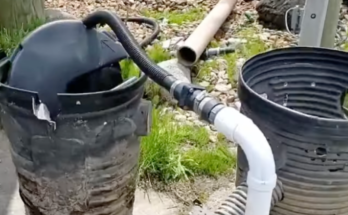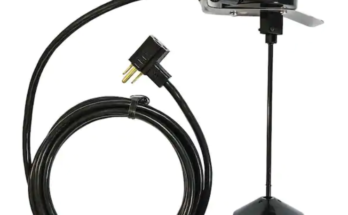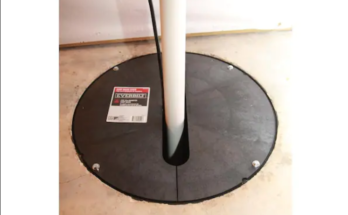Debunking the Myth: Sump Pump Check Valve Are Optional
When it comes to protecting your basement from flooding, one component often overlooked is the sump pump check valve. You might have heard that it’s an optional accessory for your sump pump system, but let’s debunk that myth right away. A sump pump check valve is not just an add-on; it’s a crucial piece of equipment that can make all the difference between a dry basement and a waterlogged nightmare.
Understanding Sump Pump Check Valve
So, what exactly is a sump pump check valve, and why is it so important? Well, imagine this scenario: Your sump pump kicks into action, efficiently pumping out water from your basement to prevent flooding. But as soon as it shuts off, there’s a sudden influx of water rushing back into the sump pit. Without a check valve in place, your pump would have to work twice as hard to keep up with the continuous flow, leading to premature wear and tear and increased energy costs.
A sump pump check valve acts as a one-way gate, allowing water to flow out of the sump pit but preventing it from flowing back in. This simple yet effective mechanism ensures that your sump pump operates more efficiently, prolonging its lifespan and reducing the risk of basement flooding.
Types of Sump Pump Check Valve
Now that we understand the importance of a sump pump check valve, let’s explore the different types available on the market. There are several variations to choose from, including ball valves, swing check valves, and flapper valves, each with its own set of advantages and disadvantages.
Ball valves, for example, are known for their durability and reliability. They use a spherical ball to control the flow of water, ensuring a tight seal when the pump is not in operation. Swing check valves, on the other hand, utilize a swinging disc to regulate water flow, making them ideal for high-flow applications. Flapper valves, meanwhile, feature a flexible flap that opens and closes with changes in water pressure, offering excellent sealing properties.
When selecting a sump pump check valve, it’s essential to consider factors such as the size of your sump pump discharge pipe, the amount of water flow, and the specific requirements of your sump pump system. By choosing the right type of check valve for your needs, you can ensure optimal performance and protection against basement flooding.
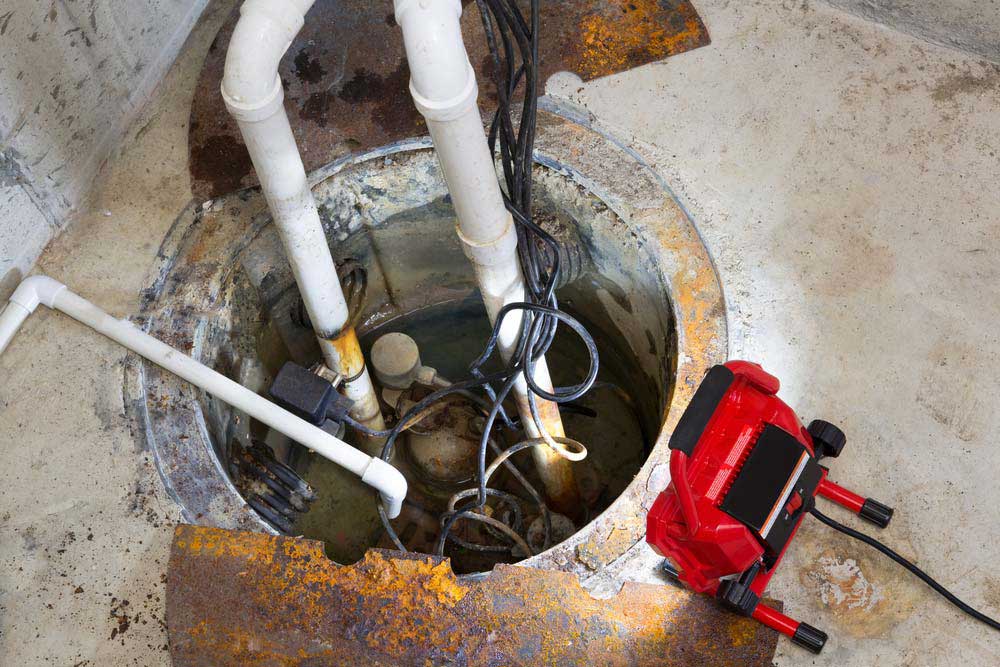
Photo by: snellheatingandair.com
Dispelling the Confusion: Choosing the Right Sump Pump Check Valve
Some homeowners might think that all sump pump check valves are created equal. After all, they all serve the same purpose, right? Well, not quite. Let’s clear up this misconception and dive into the world of sump pump check valves to understand why choosing the right one is essential for your basement’s protection.
Types of Sump Pump Check Valve
As mentioned earlier, there are different types of sump pump check valves available, each with its own unique characteristics. Let’s take a closer look at some of the most common types:
Ball Valve:
This type of check valve uses a spherical ball to control the flow of water. It’s known for its durability and tight sealing, making it a popular choice among homeowners looking for reliability.
Swing Check Valve:
Utilizing a swinging disc mechanism, swing check valves are ideal for applications with high water flow. They provide efficient backflow prevention while allowing for smooth water discharge.
Flapper Valve:
Featuring a flexible flap that opens and closes with changes in water pressure, flapper valves offer excellent sealing properties. They are versatile and suitable for various sump pump setups.
Spring Loaded Check Valve:
These valves use a spring mechanism to keep the valve closed when the pump is not in operation. They are known for their quick response time and are commonly used in high-pressure systems.
Factors to Consider When Choosing
Now that we’ve covered the different types of sump pump check valves let’s discuss the factors you should consider when selecting the right one for your needs:
Size:
The size of your sump pump discharge pipe will determine the size of the check valve you need. Make sure to choose a valve that fits snugly without restricting water flow.
Material:
Check valves are typically made from materials like PVC, ABS, or metal. Consider factors such as corrosion resistance and durability when selecting the material for your valve.
Compatibility:
Ensure that the check valve you choose is compatible with your sump pump system. Some valves are designed for specific pump models or discharge configurations.
Flow Rate:
Consider the amount of water your sump pump handles and choose a check valve with an appropriate flow rate capacity to accommodate your pump’s performance.
By taking these factors into account and selecting the right type of sump pump check valve for your specific requirements, you can ensure optimal performance and long-term reliability for your basement waterproofing system. Stay tuned for our next installment, where we’ll delve into common problems and solutions related to sump pump check valves.
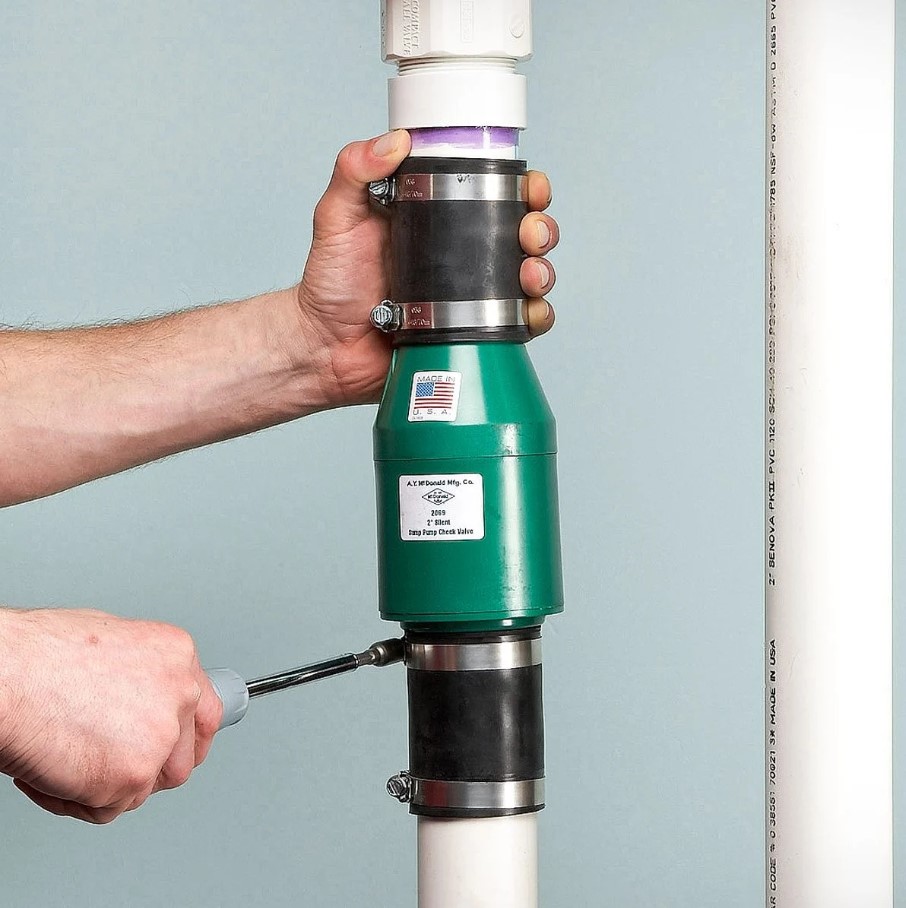
Photo by: familyhandyman.com
Busting Myths: Sump Pump Check Valves Aren’t Immune to Problems
Many homeowners believe that once they install a sump pump check valve, their basement flooding worries are over. Unfortunately, that’s not entirely true. While sump pump check valves play a vital role in preventing water backflow, they can still encounter issues that need addressing. Let’s explore some common problems associated with sump pump check valves and how to solve them.
Common Problems with Sump Pump Check Valves
Noise:
One of the most common complaints homeowners have about their sump pump check valves is the noise they make during operation. A loud clunking or banging sound can indicate a problem with the valve’s mechanism or installation.
Sticking:
Over time, debris or sediment buildup can cause the check valve to stick in the closed position, preventing proper water flow. This can put added strain on the sump pump and increase the risk of flooding.
Leaking:
A leaking check valve can allow water to seep back into the sump pit, defeating its purpose entirely. Leaks can occur due to worn seals, cracks, or loose connections.
Faulty Installation:
Improper installation of the check valve can lead to a host of issues, including noise, sticking, and leaking. It’s crucial to follow manufacturer guidelines and ensure a secure, airtight fit.
Troubleshooting and Solutions
Now that we’ve identified some common problems let’s discuss how to troubleshoot and resolve them:
Noise:
If your check valve is making excessive noise, check for loose connections, damaged components, or air trapped in the line. Tighten any loose fittings, inspect the valve for debris, and consider adding insulation to dampen sound.
Sticking:
To address a sticking check valve, first, turn off the sump pump and disconnect power. Then, inspect the valve for debris or obstructions and clean it thoroughly. Lubricate moving parts if necessary and ensure proper alignment during reinstallation.
Leaking:
Leaks can often be fixed by replacing worn seals or tightening connections. If the valve itself is damaged, consider replacing it with a new one. Be sure to use high-quality materials and follow manufacturer recommendations for installation.
Faulty Installation:
If you suspect the check valve was improperly installed, carefully inspect the setup for any signs of misalignment or improper fit. Correct any issues following manufacturer guidelines or consult a professional if needed.
By addressing these common problems promptly and effectively, you can ensure that your sump pump check valve continues to protect your basement from flooding efficiently. In our next installment, we’ll delve into essential maintenance tips to keep your sump pump check valve in top condition.
Final Verdict
In conclusion, while sump pump check valves play a crucial role in safeguarding basements against flooding, they are not immune to problems. By addressing common issues promptly and effectively, homeowners can ensure that their sump pump check valves continue to function reliably and protect their homes from water damage. Stay tuned for our next installment, where we’ll delve into essential maintenance tips to keep your sump pump check valve in top condition.
Frequently Asked Questions (FAQs)
Q: Why do I need a sump pump check valve? A: A sump pump check valve is essential for preventing water from flowing back into the sump pit after the pump has shut off. Without a check valve, your pump would have to work harder to keep up with the continuous flow, increasing the risk of premature wear and tear and basement flooding.
Q: What are the different types of sump pump check valve? A: There are several types of sump pump check valves available, including ball valves, swing check valves, flapper valves, and spring-loaded check valves. Each type has its own unique characteristics and advantages, so it’s essential to choose the right one for your specific needs.
Q: How do I know if my sump pump check valve is malfunctioning? A: Some common signs of a malfunctioning check valve include excessive noise during operation, sticking or jamming of the valve, leaks, and improper installation. If you notice any of these issues, it’s essential to address them promptly to prevent further damage to your sump pump system.
Q: Can I replace a sump pump check valve myself? A: While some homeowners may feel comfortable replacing a sump pump check valve themselves, it’s essential to have the necessary knowledge and skills to do so safely and effectively. If you’re unsure, it’s always best to consult a professional plumber or sump pump technician to ensure proper installation and functionality.
Q: How often should I maintain my sump pump check valve? A: It’s recommended to inspect and maintain your sump pump check valve at least once a year to ensure proper functionality and prevent potential issues. Regular maintenance tasks may include cleaning the valve, checking for leaks, and lubricating moving parts as needed.
Q: What should I do if my sump pump check valve is making noise? A: If your sump pump check valve is making excessive noise during operation, it could be due to loose connections, debris buildup, or air trapped in the line. Try tightening any loose fittings, cleaning the valve, and adding insulation to dampen sound. If the noise persists, consider consulting a professional for further assistance.
Q: How can I prolong the lifespan of my sump pump check valve? A: To prolong the lifespan of your sump pump check valve, it’s essential to follow manufacturer guidelines for installation and maintenance. Regular inspection, cleaning, and lubrication can help prevent issues and ensure optimal performance. Additionally, addressing any problems promptly can help prevent further damage and extend the life of your valve.

